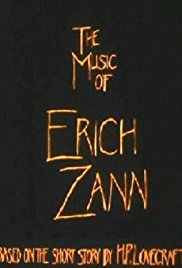 Easily the BEST EVER short film to be adapted from the writings of H.P. Lovecraft, THE MUSIC OF ERICH ZANN is a small classic from 1980 that fully retains the haunting aura of Lovecraft’s incomparable story of the same name while weaving a powerfully effective spell in its own right.
Easily the BEST EVER short film to be adapted from the writings of H.P. Lovecraft, THE MUSIC OF ERICH ZANN is a small classic from 1980 that fully retains the haunting aura of Lovecraft’s incomparable story of the same name while weaving a powerfully effective spell in its own right.
Certainly filmmaker John Strysik had his work cut out for him when he decided to adapt H.P. Lovecraft’s 1921 story “The Music of Erich Zann” for a student film project at Columbia College. The story might seem like ideal student film material on the surface—it only has three characters, after all, and a single setting–but presents a filmmaker with any number of all-but insurmountable obstacles. It was one of Lovecraft’s personal favorite stories (and remains my own favorite of his tales), being the admirably compact, concentrated account of a young man ruminating on his experiences at a Parisian boarding house situated on the mysterious Rue D’Ausiel, a street the man has never subsequently been able to locate on any map. It seems that while there he heard the hauntingly weird violin music of Erich Zann, which he attempted to get the old musician to play for him; Erich Zann shunned the request, until one fateful night when the narrator found himself in Zann’s top floor room and the latter suddenly grabbed his instrument to do battle with an unearthly force lurking outside…
Lovecraft never explicitly describes Zann’s weird music and devotes even less verbiage to what the narrator sees when he finally peers out Zann’s window. Thus any prospective film adaptation is automatically doomed to at least partial failure, as the filmmaker has no choice but to create music for Erich Zann and show what lurks outside the window. My own ideas of the above are, I feel, far more effective than what John Strysik gives us in his adaptation, but I found the film deeply effective nonetheless.
I’m pleased that THE MUSIC OF ERICH ZANN is finally available on DVD as part of volume three of Lurker Films’ “H.P. Lovecraft Collection” of shorts culled from the Portland based H.P. Lovecraft Film Festival, of which ZANN was one of the inaugural entries back in 1996. In my view the present film is, as I mentioned above, the best of the lot, and was an admitted inspiration on many of the others, most notably Bryan Moore’s COOL AIR (from 1999, which is nearly as potent).
The naïve young Charles Dexter Ward finds himself staying at a boarding house on the mysterious street Rue D’Ausiel during his studies in Paris. In his room each night he hears haunting violin music emanating from the building’s top floor, where, he learns, an old man named Erich Zann lives. He convinces Zann to play for him one night, but when he asks the old man to play the eerie refrain that drew Ward to him, Zann violently refuses and asks the building’s proprietor to re-locate Ward on a lower floor.
The music continues to haunt Ward’s dreams, however. One night he hears a falling sound from Zann’s upstairs room and knocks on the door to see if he’s okay. Zann invites him in and promises to write down the full explanation of his “blasphemies.” After he’s filled several handwritten pages, however, strange tones are heard coming from Zann’s curtained window; the musician grabs his violin and commences playing it in an apparent attempt at keeping whatever is lurking outside at bay. During the melee Zann’s papers are blown through the window and Ward takes the opportunity to part the curtains and look out…and is confronted with all manner of unearthly visions.
THE MUSIC OF ERICH ZANN has received rapturous praise from the renowned Lovecraft scholar S.T. Joshi and the fantasy writer (and Lovecraft confidante) Fritz Leiber, and was furthermore a finalist for the Student Academy Awards. It’s easy to see why: the film is superbly photographed by cinematographer Michael Goi in seductive lamp lit hues and has a measured pace and foreboding atmosphere that favorably conjure the spirit of HPL, something few other films, student or otherwise, have managed to accomplish.
A few of Strysik’s effects fall flat: in an attempt at conveying the hallucinatory description “In his frenzied strains I could almost see shadowy satyrs and bacchanals dancing and whirling insanely”, Strysik utilizes a silhouette of a dancing woman, an effect that simply doesn’t work (I found myself wondering who the lady was and how she got inside Zann’s room). Much criticism has also focused on the final 2001: A SPACE ODYSSEY-esque lightshow the protagonist sees outside Zann’s window (a vision Lovecraft imparts via the following ambiguous stream of words: “the blackness of space illimitable; unimagined space alive with motion and music”), but I quite liked the effect, which rounds the film out on a memorably trippy note.
Vital Statistics
THE MUSIC OF ERICH ZANN
Essential Saltes Productions/Lurker Films
Director/Screenwriter/Editor: John Strysik
Producers: John Strysik, Robert Rothman
Cinematography: Michael K. Choi
Cast: Robert Ruevain, Robert Alexander, Darryl Warren, Barbara Snapp
